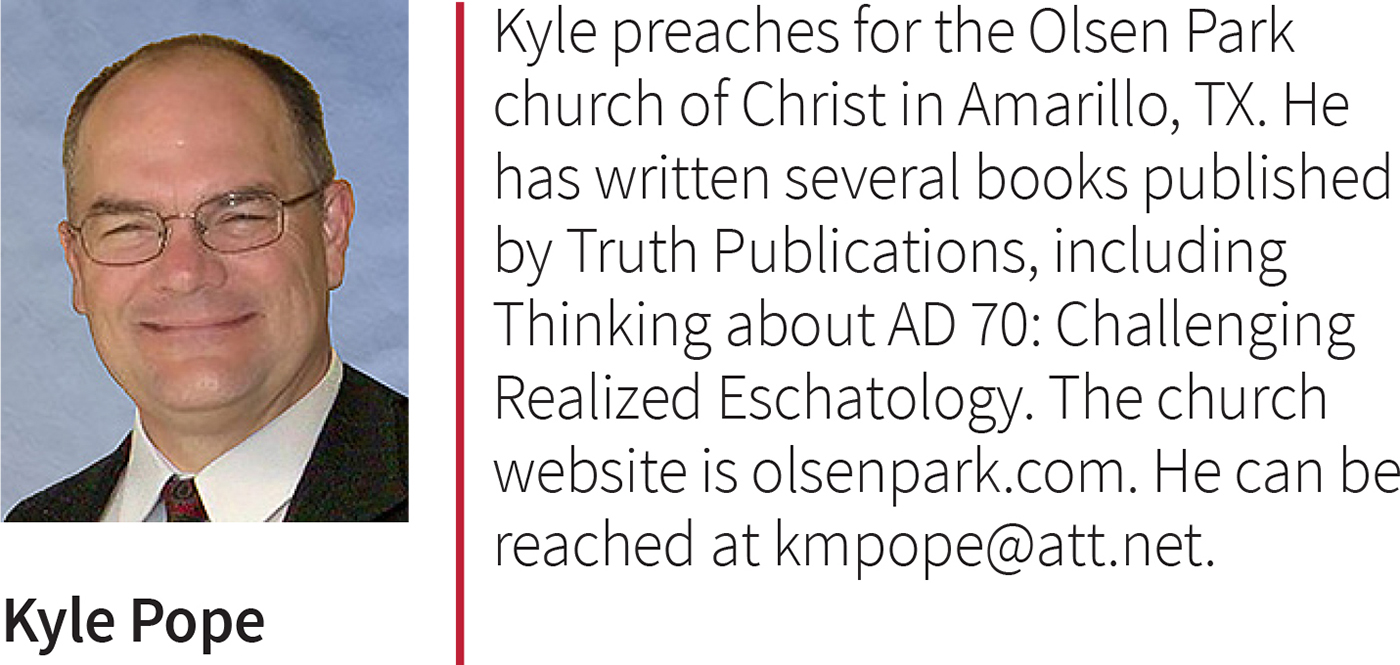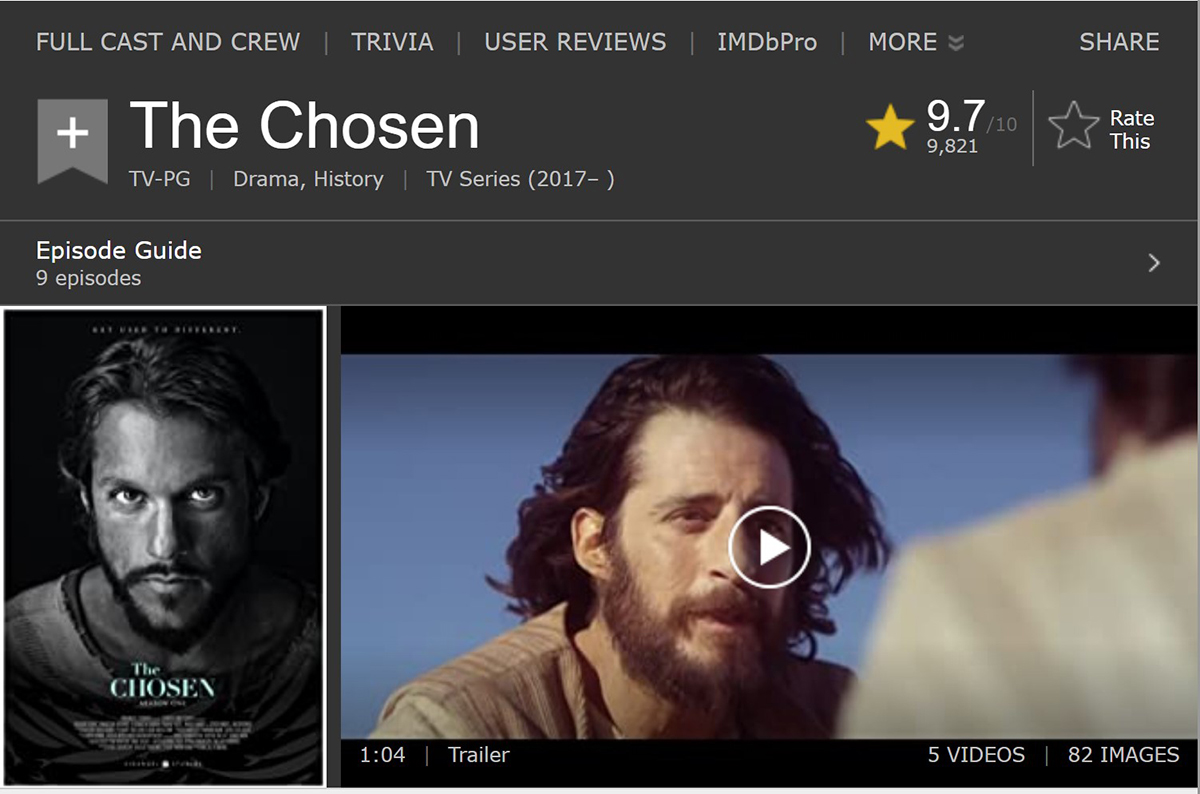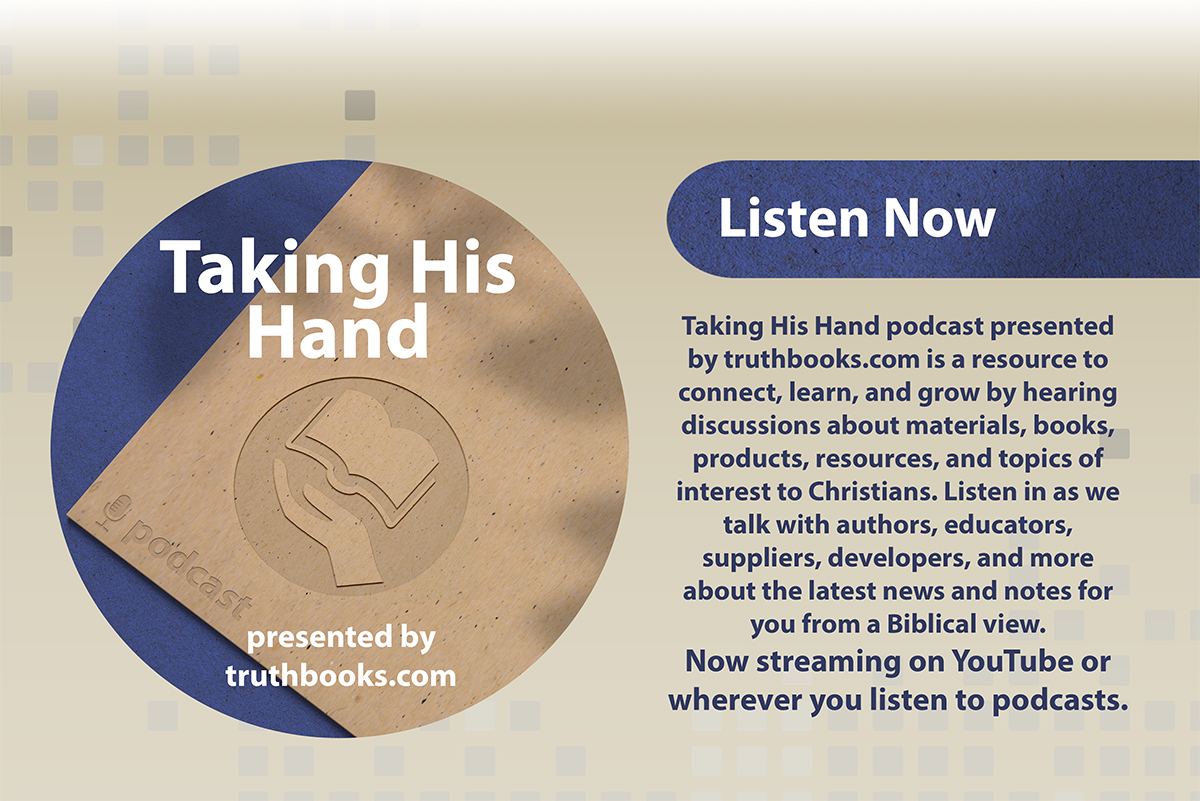
by Kyle Pope
Synopsis: For those who have seen ads promoting this popular series on the life of Christ and wondered what it is and whether it is worth watching, brother Pope offers a review and summary of the first season.
If you are a user of any social media or streaming service, you will most likely have seen ads for a series called The Chosen. Perhaps, if you are like me, you are cautious of any film portrayals of biblical events, especially when they seek to illustrate Jesus's life. At the suggestion of our son, my wife and I recently watched all eight episodes of the first season. Please allow me to offer some thoughts and impressions about it for any who might consider watching it or who may have already viewed it.
Unlike a movie that you rent or see at the theater, this series actually focuses on the life of Christ. Reportedly, it is the first multi-episode and (according to all plans) multi-season production addressing Jesus's life. It is accessible through a free app by VidAngel available in the Android and iOS app stores. The episodes are free, but the production is "crowd-funded"—that is, its producers can only make episodes as they receive viewer contributions to fund future productions. While those who wish can purchase DVDs, most watch the series on their mobile devices or "cast" it to a large screen television through various methods.
The Chosen is the creation of a young filmmaker named Dallas Jenkins, the director and co-writer of the series. He is the son of the religious writer, Jerry B. Jenkins, co-author of thirteen books in the Left Behind series, which popularized premillennialism in modern culture in recent decades. While Jenkins identifies himself as an "evangelical," so far, I have seen no overt attempts to promote Premillennial concepts in the first eight episodes. The app offers a separate section as a supplement to the episodes called the "Deep Dive." This section provides extended interviews in which Jenkins discusses each episode with an evangelical professor, a Catholic priest, and a Messianic Jewish rabbi. During these interviews, he explores, "What did we get wrong and what did we do right?" While I cannot agree with everything said in these interviews, Jenkins clearly believes in the absolute inspiration of the biblical text. Any creative artistic coloring he has provided within the series was done cautiously, striving to avoid anything contrary to biblical principles and our knowledge of first-century culture and conditions. In light of what we can usually expect from Hollywood these days, I appreciated that.
Let me start with the positives. Unlike many modern religious films, this portrayal of Jesus does not shy away from the tough stuff. Like the Jesus of Scripture, the series has Him teaching the coming of final judgment and warning of eternal punishment. He tells the Parable of the Dragnet (Matt. 13:47-50) and the discussion about those who died when the tower in Siloam fell, which concludes, "unless you repent you will all likewise perish" (Luke 13:2-5).
The series has a powerful way of making familiar stories come alive in a way that many may relate to as never before. Peter, a hardened fisherman whom Scripture records first telling Jesus, "Depart from me, for I am a sinful man, O Lord!" (Luke 5:8)—sees his life transformed when he recognizes that Jesus truly is the Messiah, who can fill his empty boats with fish (see Luke 5:1-7) and change him into a fisher of men. Nicodemus, a Pharisee committed to the "tradition of the elders" (cf. Mark 7:3) and a respected member of the Jewish council (see John 3:1-21; 7:50-51)—confronts the life-changing consequences of what he learns from his night meeting with Jesus about being "born again" (John 3:3, 7). Matthew, whom the film portrays as a gifted fastidious young man with Asperger's syndrome—ostracized from his family and countrymen because of his career as a tax-collector (cf. Matt. 9:9-13)—leaves behind all that he understands to follow One who is like no one he has ever met before (cf. John 7:46). According to Jenkins, who identifies himself as being on the autism spectrum, this portrayal of Matthew has received more positive feedback than anything else in the series. Those with similar conditions are able to relate to one of Jesus's disciples in a way they never imagined before.
These touching portrayals of a Jesus that smiles, laughs, and becomes deeply involved in the lives of those He calls to follow Him are quite powerful. The healings of the leper (Luke 5:12-14), the paralytic lowered through the roof (Mark 2:1-12), and the casting out of demons from Mary Magdalene (cf. Mark 16:9) are moving scenes that may bring tears to the eyes of the viewer. Old and New Testament Scriptures run throughout the series offering the viewer Old Testament background for many New Testament events. The Chosen takes these accounts off the two dimensions of the written page and allows the viewer to see a three-dimensional Savior and His disciples in ways they may not have been able to in the past.
As mentioned above, this was something Jenkins repeatedly asked the religious consultants he interviewed (and apparently regularly consulted during production). Actually, I would probably address this a bit differently. The Chosen attempts to do something that Jenkins himself recognizes is difficult to do carefully—establish character background to understand what we read in the biblical text. Some will see this as adding to Scripture (cf. Rev. 22:18-19), but Jenkins is emphatic that he is not trying to do that. Certainly, many characters in Scripture had experiences that shaped them before they were introduced into the biblical text. Is there a careful way to portray and consider possibilities regarding this background? Jenkins tries to establish plausible backgrounds (keeping within what is known) to lead into the biblical events.
This is tricky business—fraught with numerous pitfalls and dangers. For example, Scripture records that Jesus cast seven demons out of Mary Magdalene (Mark 16:9), but it does not tell us when and how this happened. The Chosen imagines that Mary was a troubled, demon-possessed woman whom even Nicodemus could not help with her condition. Yes, some Jewish leaders cast out demons (Matt. 12:27). Could Nicodemus have tried and failed? Perhaps, but the Bible doesn't say that. In The Chosen, Jesus first confronts Mary in a drinking establishment—which Jenkins's Jewish consultant advised him would likely not have existed in first-century Palestine. Yes, Jesus went to sinners, but Scripture never describes Him as being present when sin was taking place. The Chosen imagines that Simon Peter gets behind on taxes, leading him to fish on the Sabbath (another choice Jenkins's Jewish consultant advised him against) and then conspire with the Romans to betray other Jewish fishers. Yes, Peter was a "sinful man" (Luke 5:8), but none of these things is recorded in Scripture. In The Chosen, a repentant Mary Magdalene leads the Sabbath celebration meal in a home with Jesus present. This likely reflects the pressures of our culture to allow women to exercise leadership in religious matters—something Scripture prohibits (cf. 1 Tim. 2:10-11). Jenkins's Jewish consultant advised him yet again that this would not have happened.
The evangelical consultant was troubled by some dates used in Old Testament flashbacks and New Testament events that he felt were inaccurate. Apparently, some of this was accidental, and some of it resulted from loosely trying to choose between disputed dates. Those familiar with Scripture will note that the miracle at the wedding feast in Cana (John 2:1-11), described as "the beginning of signs" (John 2:11), is not the first miracle The Chosen portrays Jesus performing. This reflects a question scholars have about whether the changing of the water to wine was the first miracle (of any type) or the first public miracle (cf. Matt. 4:23; John 21:25)—a discussion portrayed as taking place among His disciples. Yet, Scripture does not record such. The Chosen speculates about details of the past marriage conditions of the Samaritan woman at the well, which are not in Scripture (John 4:1-42). The Chosen also imagines that Thomas provided the wine at the feast in Cana when it ran out (John 2:1-11). Scripture doesn't say that.
An episode that Jenkins acknowledged was the most speculative portrays Jesus (before His public ministry began) finding Himself surrounded by children who begin flocking to Him as He works as a carpenter (cf. Mark 6:3). He is playful with the children, encouraging them to serve God faithfully, be obedient to their parents, and teaches them things that will later be part of His public ministry. At one point, He asks them to say the Shema (pronounced "shmah"), the Jewish prayer still repeated by modern Jews—"Hear, O Israel: The LORD our God, the LORD is one! You shall love the LORD your God with all your heart, with all your soul, and with all your strength" (Deut. 6:4-5; cf. Mark 12:29-30)—tearing up as He hears them say these words. Indeed, this is a very touching episode! Yes, Jesus welcomed children (cf. Matt. 11:16; 18:3; 19:13-14; Mark 9:36; 10:16). Undoubtedly, things like this must have happened, but the particulars portrayed in The Chosen are not recorded in Scripture.
So, should you watch The Chosen? Do I recommend it? That depends. Compared to other movies and television shows that we are now offered, it is definitely a breath of fresh air. There is no foul language and no immodesty. Scripture and faith are not mocked but embraced! However, the danger comes in the areas where artistic license was taken. Because something could have happened doesn't mean we should let our minds paint it as if it did happen. Will viewers distinguish biblical facts from creative imagination? That's the danger!
To his credit, Jenkins hopes that The Chosen will move people to open their Bibles and read the inspired accounts to compare (and test) what the Holy Spirit records with what has been portrayed in the series. If you and your family will do that, watching The Chosen may well be a good way to encourage further discussion and study. 


